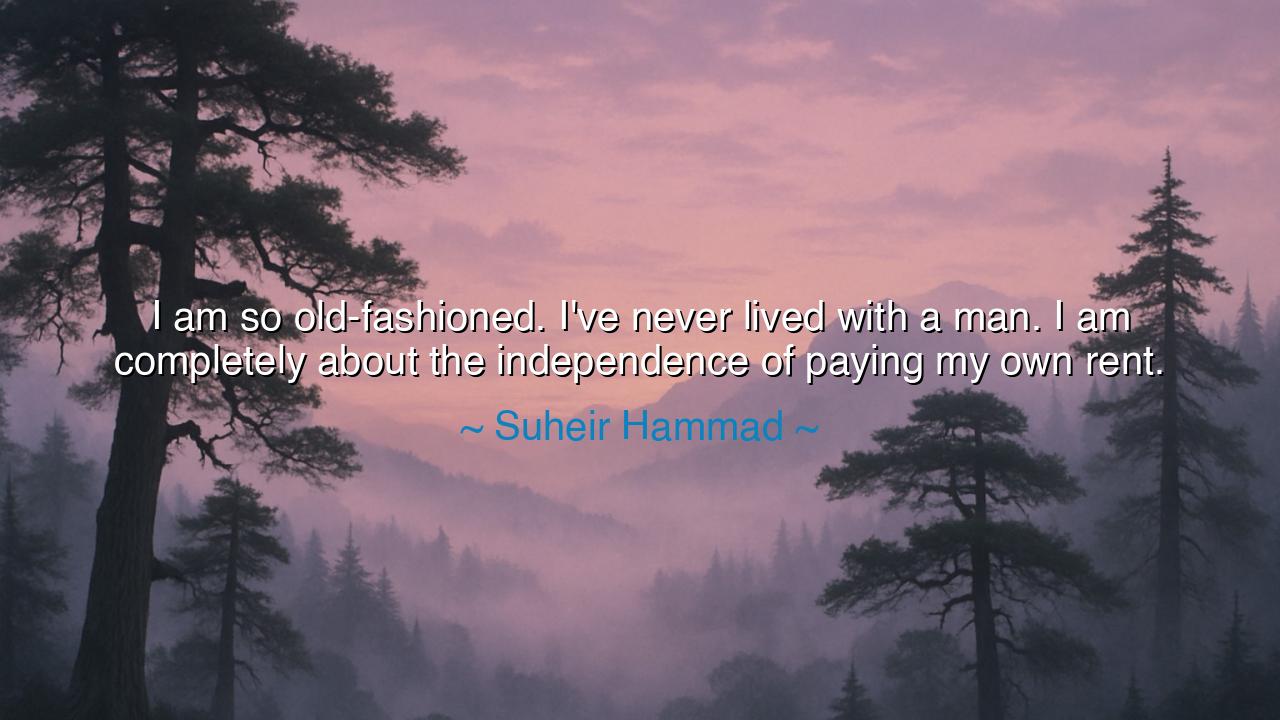
I am so old-fashioned. I've never lived with a man. I am
I am so old-fashioned. I've never lived with a man. I am completely about the independence of paying my own rent.






The Strength of Standing Alone
Hear now the words of Suheir Hammad, a poet forged in exile and reborn in selfhood, who once declared:
“I am so old-fashioned. I've never lived with a man. I am completely about the independence of paying my own rent.”
These words, though simple in form, are the utterance of a soul that has known both struggle and dignity, both the pull of tradition and the fire of self-reliance. In them is contained a timeless truth: that independence—especially for the heart and spirit of a woman—is not mere solitude, but sovereignty. Hammad speaks not of rebellion, but of mastery over one’s own life, one’s own choices, one’s own roof beneath the stars.
The Spirit Behind the Words
To understand her saying, one must know the world that shaped her. Suheir Hammad, a Palestinian-American poet, carries within her the memory of displacement—the pain of families uprooted and of women whose voices were too often bound by the weight of custom. Her declaration is thus an act of quiet defiance, a song of ownership—not just of property, but of destiny.
When she says she believes in “paying my own rent,” she is proclaiming a deeper freedom: the ability to stand upon one’s own labor, to live not by permission but by right. To pay one’s own way, to build one’s own home, is to declare before the world, I exist not as an ornament of another’s life, but as the architect of my own.
The Ancient Echo of Independence
Though her words are modern, the spirit behind them is ancient. The poets and philosophers of old spoke often of autarkeia—self-sufficiency—as the foundation of wisdom. The Stoics of Greece, the mystics of Persia, the mothers of early civilizations all knew: the one who depends wholly on others for their peace or sustenance is easily unmade. But the one who stands firm within themselves cannot be shaken by fortune or by man.
So Hammad’s independence is not pride—it is integrity. It is the stillness of the mountain that shelters its own roots, the river that carries its own source. She honors an ancient truth: that true love and communion with others can only bloom when both souls stand whole, each unafraid to stand alone.
A Reflection in History
Think of Hypatia of Alexandria, the philosopher and mathematician of the ancient world. She, too, lived as Hammad speaks—independent, devoted to her calling, unbound by the expectations of men. Her freedom was not only intellectual, but moral: she refused to let her worth be measured by companionship or wealth. Though her enemies destroyed her body, her name endures, a beacon of what it means to live wholly by one’s own light.
Hammad’s declaration stands in the same lineage. In her time, as in Hypatia’s, the world often whispers to women that to stand alone is to be incomplete. Yet both reveal that solitude chosen in strength is not a void—it is a temple.
The Sacred Balance Between Old and New
It is not without tenderness that she calls herself “old-fashioned.” In this phrase lies both irony and reverence. She honors the values of the past—the dignity of earning, the pride of responsibility, the moral worth of independence. Yet she lives them in a world that has tried to strip them of meaning. Where others may see dependence as convenience, she sees it as danger to the spirit. Her “old-fashioned” way is, in truth, timeless—a return to the virtue that the ancients called self-mastery.
Her refusal to share a home with a man is not disdain—it is discipline. It is a form of boundaried love, a recognition that intimacy without independence is possession, and that a soul must first belong to itself before it can belong to another.
The Lesson of the Free Soul
Learn, then, from Suheir Hammad’s teaching: the one who pays their own rent pays also for their freedom. To earn one’s keep, to build one’s own roof, to stand without fear of abandonment—these are not mere acts of survival, but rituals of self-respect. The greatest wealth is not gold, nor comfort, nor approval—it is the power to say, I sustain myself.
So, O listener, cultivate this spirit. Build your life upon your own hands. If you share your table, let it be out of love, not need. If you dwell with others, let it be as an equal, not a dependent. And if ever the world tempts you to rely too much upon another, remember: it is not isolation to stand alone—it is strength.
The Eternal Truth
For in the end, independence is not an act of separation, but of unity—with one’s self, one’s dignity, one’s purpose. The ancients taught that to know thyself is to be free; Hammad teaches that to sustain thyself is to be whole. When you walk through the world carrying your own light, you need not fear the darkness.
So live as she lives—steadfast, self-made, old-fashioned in the truest sense: guided by honor, humility, and the fierce beauty of self-reliance. For the one who can stand alone in peace will always stand tall among others.






AAdministratorAdministrator
Welcome, honored guests. Please leave a comment, we will respond soon